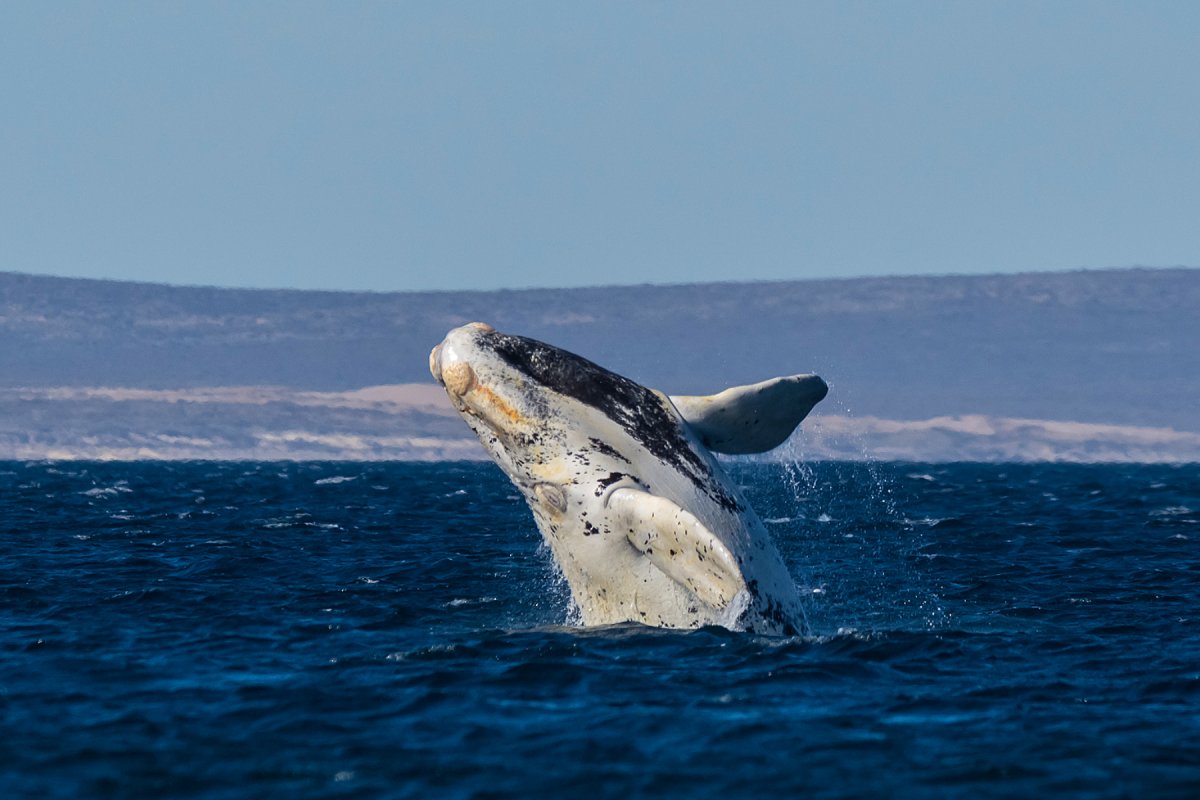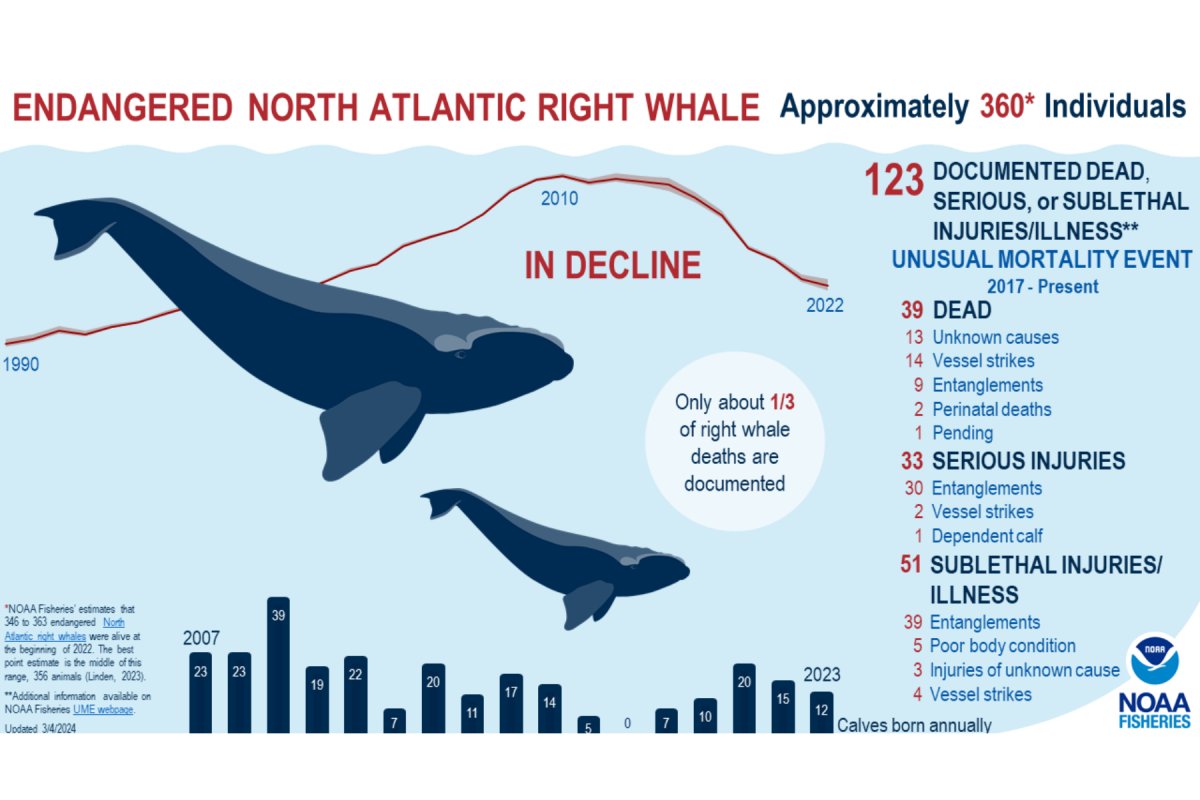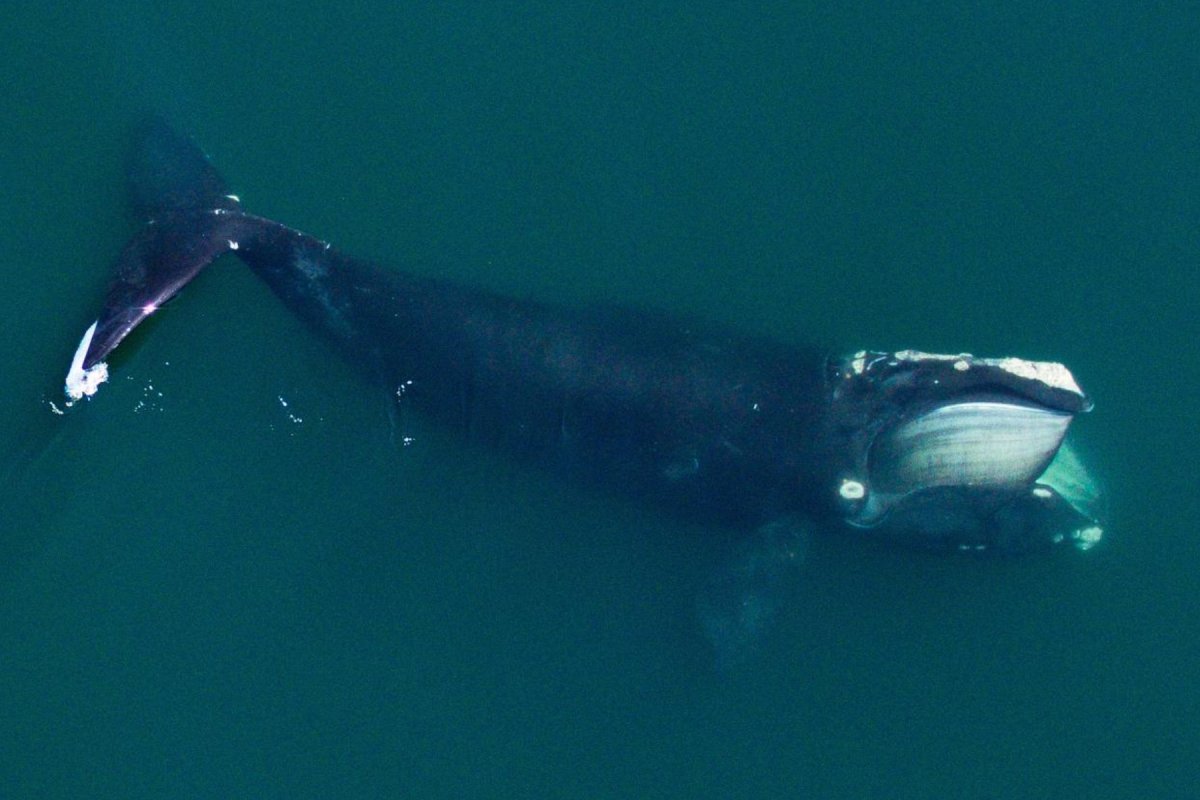A critically endangered whale species has fewer offspring because of increasingly frequent entanglement in fishing gear.
North Atlantic right whales—of which there are only an estimated 356 left in the wild worldwide—are less likely to have calves if they have been tangled in ropes from fishing gear, a new study in the journal Royal Society B: Biological Sciences reveals.
This, combined with a number of other factors stacking against the whales, may further push them closer and closer to the brink of extinction.

"This study makes it clear that all types of entanglement in fishing gear impact females' ability to calve, helping address one of the big, outstanding questions for saving North Atlantic right whales," paper co-author Joshua Reed said in a statement.
Reed is a marine science doctoral candidate at Macquarie University in Sydney.
North Atlantic right whales can weigh up to 140,000 pounds, and grow as long as 52 feet. They are listed as critically endangered on the IUCN Red List, and are continuously declining in population. They were heavily hunted during the whaling era, particularly in the 19th and early 20th centuries, and have yet to recover, with fewer than 70 females currently being reproductively active.
One major threat to these whales is entanglement in fishing gear, such as ropes and nets. This may lead to injuries, infections, or even death. This problem is exacerbated by the fact that right whales feed in areas where fishing activities occur.
"Almost all females, 89 percent, have experienced at least one entanglement event during their lifetime, and almost two-thirds of these have experienced two or more, with many resulting in injury or mortality," the authors wrote in the paper.
Using whale-sightings data from across 40 years, the paper found that female whales who had survived entanglement were much less likely to have babies than those who had never been entangled. Whether or not they had been caught up in gear was determined from the degree of injuries caused by the ropes, which were classified either as "minor," "moderate" or "severe."
"Poor calving is a significant contributor to the decline of North Atlantic right whales. Surprisingly, we found those entanglements that were considered 'minor' to have a significant impact on the probability of a female right whale becoming a successful breeder. This highlights that both the lethal and sub-lethal impacts of entanglements are of grave concern for this species," Reed told Newsweek.
The research showed pre-breeding age female whales that survive entanglements classed as 'minor' were the least likely to transition to breeding, with individuals in this class being 47 percent less likely to breed than those that had never been entangled.
What's counter-intuitive is that "minor" entanglements impact this likelihood more than do "moderate" entanglements. "moderate" entanglements affect the survival probability of pre-breeders more than those of whales who've had at least one calf," Reed said.
But the point that even "minor" entanglements impact whether or not females have their first calf is important, as it suggests that something about enough of the entanglements that are judged "minor" from scarring that is significant enough to affect the whale's ability to start calving.

"Poor calving is one of the main factors behind the decline of North Atlantic right whales and, until now, the reason for these whales' failure to calve wasn't clear," Reed said.
Despite all this, those who survive entanglement are the lucky ones: many of these whales wash up on the shore stranded or dead as a result of injuries sustained by entanglement in fishing gear or other marine pollution. Other threats facing the tiny population include ship strikes and habitat degradation.
This research comes mere weeks after another paper found that female North Atlantic right whales were shrinking in size, further contributing towards decreased calving rates in this endangered population. A 46-foot female was found to have a 56 percent chance of successfully giving birth, compared to a 10-foot smaller female at 36 feet, which only had a 14 percent chance.
The researchers hope that this study highlights the importance of understanding the impacts that fishing entanglements have on this dwindling species.

"Applying a standard technique in a new way to a well-studied species allows us to come up with a better understanding of how human impacts—in this instance, fishing entanglements—affect these female whales' survival and reproduction," co-author Leslie New, an assistant professor in statistical ecology from Ursinus College in Pennsylvania, said in the statement.
Additionally, they note that the research shows that females who were only mildly injured by entanglements also had decreased calving rates, meaning that all fishing gear needs to be considered when thinking of conservation solutions for these whales.
"Weak rope is a technology now used to try to reduce the severity of entanglements, but it doesn't change whether whales will get entangled," co-author Peter Corkeron, a marine ecologist and conservation biologist from Griffith University in Brisbane, Australia, said in the statement.
"This paper indicates rope technology won't solve the problem of female right whales' poor calving. We need to get all rope out of the water urgently for this species to start to recover."
Do you have a tip on a science story that Newsweek should be covering? Do you have a question about North Atlantic right whales? Let us know via science@newsweek.com.
Update 03/15/24 1:36 p.m. ET: This article was updated with comment from Joshua Reed.
Uncommon Knowledge
Newsweek is committed to challenging conventional wisdom and finding connections in the search for common ground.
Newsweek is committed to challenging conventional wisdom and finding connections in the search for common ground.
About the writer
Jess Thomson is a Newsweek Science Reporter based in London UK. Her focus is reporting on science, technology and healthcare. ... Read more
To read how Newsweek uses AI as a newsroom tool, Click here.






